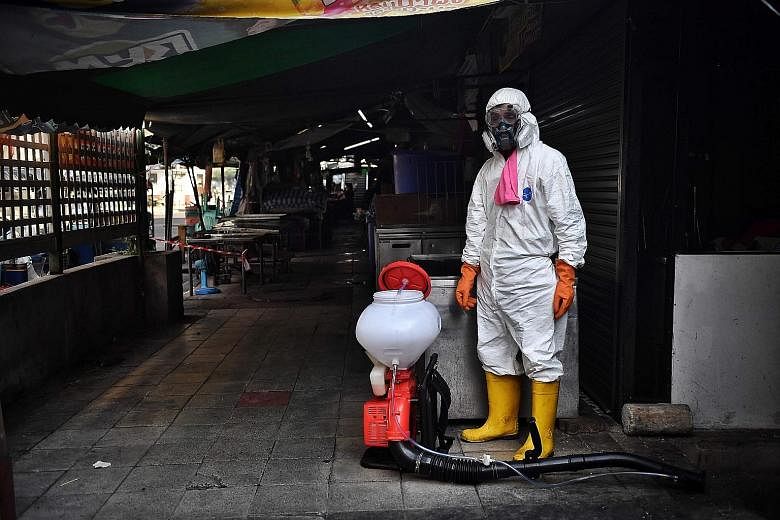Thailand looked like it was ahead in the regional scramble for a coronavirus vaccine in October when it announced that a local firm would manufacture the OxfordAstraZeneca vaccine for domestic use and distribution to nearby countries.
But with a locally produced vaccine months away while local transmissions grew over the new year, Thailand sought to boost its initial reservation of 26 million doses. It ordered 35 million more, and supplemented that with two million doses of the vaccine from China's Sinovac Biotech. The first batches of British and Chinesemade vaccines are expected to arrive next month.
Neighbouring Cambodia levelled up with some help from close ally China, which pledged to gift it one million doses of the vaccine. According to local media, the first 300,000 doses from China's Sinopharm are also expected to arrive next month.
But it was Myanmar that took the eventual lead. New Delhi sent it 1.5 million free doses of the Indian-manufactured OxfordAstraZeneca vaccine last Friday, as part of its Vaccine Maitri (friendship) Initiative. The first Myanmar healthcare workers will get their jabs starting this week.
With millions of dollars at stake and much still to be learnt about Covid-19, the regional race to acquire enough vaccines has been coloured by geopolitics and shaped by domestic sentiment.
Bangkok, after making public its plan to use China-made vaccines, found itself on the back foot when locals questioned their efficacy. Thai Prime Minister Prayut Chano-cha had to personally reassure people that only vaccines proven safe would get the green light.
Thailand's vaccine efforts are now also embroiled in the polaris ing debate about royal wealth and privilege raised by young street protesters last year. This was after opposition figure Thanathorn Juangroonruangkit alleged that the deal between AstraZeneca and its chosen local manufacturer Siam Bioscience - owned by King Maha Vajiralongkorn - lacked transparency.
The Thai government promptly lodged lese majeste complaints against Mr Thanathorn, making some wonder whether discussion about a central plank of Thailand's vaccine strategy was now a no-go zone.
Over in Cambodia, Prime Minis ter Hun Sen, after vowing to use only vaccines approved by the World Health Organisation, backtracked by saying Cambodia could not afford to wait. He declared he would be first in line for the Chinese vaccine by the state-owned Sinopharm.
Dr Chheang Vannarith, president of Phnom Penh-based think-tank Asian Vision Institute, says China's vaccine donation was a reflection of solid Sino-Cambodia ties.
''China is here to stay in Cambodia and I don't think any other major powers can challenge that status quo,'' he told The Straits Times.
Even so, Mr Hun Sen was careful to hedge his bets, requesting vaccine donations via India's ambassador to Cambodia last Monday.
It was the Serum Institute of India, the world's largest vaccine maker, that Myanmar eventually turned to when it placed an order for 30 million doses of the Oxford-AstraZeneca vaccine. Like many other countries, Myanmar was in discussion with multiple sources for vaccines, ''yet it is also careful not to upset its big neighbour to the east'', says Ms Khin Khin Kyaw Kyee, a Chinawatcher at the Institute for Strat egy and Policy - Myanmar.
There were initial fears India would take months to export vaccines while the country embarked on its own massive domestic inoculation drive. But New Delhi assuaged some concern last week by sending free vaccines to nearby countries like Bangladesh, Maldives and Myanmar.
India's donation to Myanmar came about a week after visiting Chinese Foreign Minister Wang Yi pledged to give Naypyitaw 300,000 doses of the Chinese vaccine, giving the impression New Delhi was pushing back against Beijing's vaccine diplomacy.
Mr Sihasak Phuangketkeow, a former permanent secretary at Thailand's Ministry of Foreign Affairs, said: ''This is a kind of competition that doesn't hurt because there is a need, as long as the vaccine has real efficacy and the country is in some position to determine what kind of vaccines it wants.''
Mr Sihasak says Asean should coordinate the purchase of vaccines through its recently endorsed Covid-19 fund to help the neediest members and act as a clearing house for information about vaccinations to help regional borders reopen.
Amid the regional frenzy over vaccines, Vietnam stands as the odd one out. Having successfully contained two waves of infections with lockdowns, quarantines and aggressive contact tracing, it has ordered 30 million doses from AstraZeneca, but appears in no hurry to secure more for its 97 million population. It had earlier said that rushing to buy vaccines could be financially risky.
Vaccination, after all, is merely one part of the equation that can help reopen borders and rehabilitate economies devastated by the pandemic, say analysts.
Even as the region prepares to start mass vaccinations against the wily virus, the finish line remains unclear.

